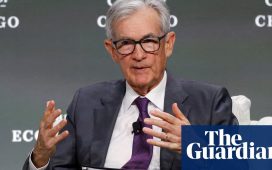UK mortgage approvals hit six-month low
Newsflash: UK mortgage approvals have fallen to their lowest level in six months, as high interest rates cool the housing market.
The Bank of England reports that net mortgage approvals for house purchases fell from 49,500 in July to 45,400 in August.
That’s the lowest number of home loans approved by lenders since February this year, and the latest sign that the 14 increases in UK interest rates since December 2021 have hit demand.
Net approvals for remortgaging (which only capture remortgaging with a different lender) saw “a significant decline” from 39,300 in July to 25,000 in August, the lowest since July 2012, the Bank says.

A report earlier this week showed that the number of first-time buyers in the UK has fallen by more than a fifth, as the jump in mortgage costs made it too expensive for some people to get onto the housing ladder.
Key events
Closing summary
Time to recap….
The UK economy made a faster recovery from the Covid pandemic than previously estimated, according to revisions to official data this morning.
Revised figures from the Office for National Statistics (ONS) showed gross domestic product was 1.8% above pre-pandemic levels at the end of the second quarter this year, stronger than Germany and France.
The changes mean the UK economy is no longer the worst performer in the G7.
Growth in January-March was also revised up, to +0.3% from a previous estimate of 0.1%.
But the UK housing market is cooling, with mortgage approvals falling in August to their lowest level in six months.
The Bank of England said net mortgage approvals for house purchases fell from 49,500 in July to 45,400 in August and were down by a third from the same month last year.
It was the lowest number of home loans approved by lenders since February this year, and the latest sign that the 14 increases in UK interest rates since December 2021 have undermined the demand for homes.
Inflation in the eurozone has dropped to a two-year low…
… as has the core PCE measure of US price changes.
The pound is on track for its worst month against the US dollar in a year – down 3.8%, or almost 5 cents, at $1.219 this afternoon.
UK households have been warned that energy bills could climb to an average of almost £1,900 a year in the coldest months of the year, under the UK government’s energy price cap scheme.
Severn Trent customers face a 37% jump in bills by the end of the decade, as the utility also raises £1bn in investment – half from Qatar’s sovereign wealth fund – to pay for a multibillion investment plan to improve its water network over the next five years.
UK households are facing the biggest increase in taxes over a parliament in at least the last 70 years:
But partners at Deloitte will be cushioned by rising incomes, with the average pay for more than 640 equity partners in the UK rising to £1.1m this year.
The Paris public prosecutor’s office is investigating financial transactions allegedly involving the French billionaire Bernard Arnault and a Russian businessman.
A week of disruption for rail passengers has begun, with a mix of strikes and overtime bans by train drivers and tube workers set to halt and delay many services until next Friday.
And Netflix is sending its final DVDs to American customers today
Have a lovely weekend, we’ll be back on Monday… GW
One final piece of economic news to wrap up the week…. and US consumer confidence has improved slightly this month.
However, Americans remain unsure about the future of the economy, with risks of a US government shutdown this weekend.
The University of Michigan’s consumer sentiment index has risen to 68.1 from 67.7 earlier in the month, although still lower than August’s 69.5.
Surveys of Consumers director Joanne Hsu explains:
A small decline in consumer expectations over their personal finances was offset by a modest improvement in expected business conditions. Consumers are understandably unsure about the trajectory of the economy given multiple sources of uncertainty, for example over the possible shutdown of the federal government and labor disputes in the auto industry. Until more information emerges about these developments, though, consumers have reserved judgement on whether economic conditions have materially changed from the past few months.
Year-ahead inflation expectations moderated from 3.5% last month to 3.2% this month. The current reading is the lowest since March 2021 and is above the 2.3-3.0% range seen in the two years prior to the pandemic.

Patrick Butler
Although GDP tracks changes in the size of the economy, it does not measure important factors, such as poverty or inequality.
And children’s charity Barnardo’s has reported today that more than a million children in the UK either sleep on the floor or share a bed with parents or siblings because their family cannot afford the “luxury” of replacing broken frames and mouldy linen.
The charity says increasing “bed poverty” reflects growing levels of destitution in which low-income families already struggling with soaring food or gas bills often find they are also unable to afford a comfortable night’s sleep.
Acute hardship was forcing families to adopt desperately improvised sleeping arrangements, it says in a report published on Friday. An estimated 700,000 children were sharing beds, while 440,000 children slept on the floor, leaving them tired, anxious and finding it hard to concentrate at school.
Parents and kids were often forced to share a bed, the Barnardo’s research found. Some parents would sleep on sofas or chairs to vacate their bed for their children. Other children would spend the night on mattresses or blankets on the floor, sometimes without sheets or duvets.
More here:
This morning’s improved growth figures means the UK’s national debt is smaller than thought, as a share of the economy.
The Office for National Statistics has published new estimates for key public-sector debt ratios on Friday, after revising up the size of the country’s economy.
Outstanding public sector net debt totalled 97.9% of annual gross domestic product in August 2023, down from an earlier estimate of 98.8%.
The budget deficit for the last financial year was revised down to 5.0% from 5.1%.
Stocks have opened higher in New York, as investors welcome the fall in the Federal Reserve’s favourite inflation measure to a two-year low.
The Dow Jones industrial average has gained 155 points, or 0.46%, in early trading to 33,821 points.
The tech-focused Nasdaq Composite is up 1%.
Transactions involving Bernard Arnault investigated over suspected money laundering

Jasper Jolly
The Paris public prosecutor’s office is investigating financial transactions allegedly involving the French billionaire Bernard Arnault and a Russian businessman.
The prosecutors are investigating transactions involving Arnault, whose ownership of the luxury goods group LVMH has made him the world’s second richest person after Elon Musk, and Nikolai Sarkisov, Reuters reported, citing a statement from the Paris prosecutor’s office. Sarkisov’s brother, Sergei, founded the Russian insurance company Reso-Garantia.
The French newspaper Le Monde first reported the existence of the investigation, citing transactions involving property at the Courchevel ski resort. It cited a December 2022 document from Tracfin, part of France’s justice system focused on combating money laundering, which reportedly lists transactions “which may characterise money laundering”.
A spokesperson forReso-Garantia said that “neither Reso-Garantia, nor Mr Sarkisov personally, has been involved in the transaction that was described in the Le Monde article. Mr Sarkisov and Mr Arnault have never met.”
Here’s some snap reaction to the drop in US core PCE inflation last month, first from Kathy Jones, chief fixed income strategist at Charles Schwab.
Here’s Art Hogan, chief market strategist at B Riley Wealth Management.
“A journey of a thousand miles begins with a single step” – August core PCE deflator comes in at 0.1% – shows slowing in key inflation metric. Bonds like it!
— Art Hogan (@ArthurHoganIII) September 29, 2023
…and Ole S Hansen, head of commodity strategy at Saxo Bank:
US PCE Deflator in line with expectations. The headline show a YoY rise to 3.5% from a revised higher 3.4% print in July, with the core falling to 3.9% with the July also seeing a small revision higher to 4.3% #inflation #FOMC pic.twitter.com/hgFFheVGUO
— Ole S Hansen (@Ole_S_Hansen) September 29, 2023
US core PCE inflation drops to two-year low
Over in the US, the Federal Reserve’s preferred inflation measure has dropped to a two-year low.
The personal consumption expenditures price index, excluding food and energy, has dropped to an annual rate of 3.9% in August, new data shows, down from 4.2% in July.
That’s the lowest reading for Core PCE since September 2021, and could signal that America’s battle against inflation is still on track.
On a monthly basis, core PCE rose by just 0.1% in August.
The headline PCE inflation rate has risen to 3.5%, from 3.4% in July.
Rishi Sunak’s optimism (see previous post) could be misplaced, if the economy stumbles in the months ahead.
The European economics team at Nomura, for example, fear that a recession could now be more likely.
Here’s their take on this morning’s upgrades to UK GDP:
While that’s a substantial revision, there are plenty of reasons to be cautious in interpreting this news, including the fact that the revision was more limited relative to the scale of moves in GDP at the time, that it’s somewhat historical, that GDP is still underperforming other countries (like the US, Scandies, Australia and NZ, and even Japan – see table below), and that the inflationary (and thereby monetary policy) consequences of the revision might be limited, if one believes that both demand and supply potential have changed at the same time.
What will be more important going forward is whether the recession we expect materialises. Indeed, a recession might even be more likely following these revisions to the extent they suggest post-pandemic catch-up growth is now more complete. That should pull down on inflation and would support our view that the Bank of England is now done tightening policy. It would also support the idea of rate cuts beginning in 2024.

The PM posts:
People doubted the strength of the UK economy – today’s data proves them wrong.
We’re sticking to the plan to halve inflation and grow the economy.
You can trust me to get it done. https://t.co/ix2sse52v8
— Rishi Sunak (@RishiSunak) September 29, 2023
Bank of England urges lenders to take care on loan default risk
The Bank of England has urged UK lenders not to underestimate the risk of loan defaults as higher inflation and increased interest rates hit more vulnerable borrowers.
In a letter to chief financial officers at financial institutions supervised by the BoE, published online, the central bank also warned them not to overestimate how much money they would recover when borrowers defaulted on loans.
Victoria Saporta, the BoE’s executive director for prudential policy, wrote:
“We encourage further efforts by firms to challenge whether models capture risks associated with affordability, including the impact of higher inflation and interest rates on vulnerable borrowers or sectors.”
Saporta added that default experience has been limited in recent years, so firms need to examine if their post model adjustments (PMAs) are up to speed:
Given higher inflation and interest rates, we believe it is important to challenge recovery assumptions used in loss given default and compensate for model and data limitations through PMAs.
Severn Trent customer water bills to rise by almost 37% by end of decade

Mark Sweney
Severn Trent is to increase customers’ bills by almost 37% by the end of the decade and has raised £1bn in investment – half from Qatar’s sovereign wealth fund – to pay for a multibillion investment plan to improve its water network over the next five years.
The company, which has 4.2 million customers, said the average annual household bill would rise from £379 in 2024-25 to £518 in 2029-30.
It predicted that by 2030 the cost of a bill would be 1.3% of the disposable income of a typical household in the Severn Trent region, compared with 1.2% today, and attempted to soften the blow by announcing a £550m financial support package for struggling customers.
The company said:
“Severn Trent recognises that while this increase is spread over a long period, today’s announcement comes at a difficult time for some customers.
“That is why we have included a £550m financial support package as a core part of the plan. This will help 693,000 customers pay their bill each year by 2030.”
The company plans to invest a record £12.9bn on its network over the next five years, including £5bn on projects designed to tackle the water industry’s poor environmental record, which it said would create 7,000 jobs across the Midlands region. More here.
Energy bills ‘could hit almost £1,900 annually’ in January
Jillian Ambrose
Household energy bills could climb to an average of almost £1,900 a year in the coldest months of the year under the government’s energy price cap, according to a leading forecaster.
The energy price cap is expected to climb from an average of £1,834 a year set to take effect from October to just under £1,898 for the months from January to March, according to analysts at Cornwall Insight, in a blow to households hit by the cost of living crisis.
The energy price cap sets the maximum price that suppliers can charge based on the typical gas and electricity bill, meaning a cold winter could push bills higher if households need to keep the heating on for longer. The cap remains more than 50% higher than pre-pandemic levels.
The Office for National Statistics is pretty clear that its revisions to GDP data are not fixing ‘errors’ – but a natural feature of how national accounts are compiled.
In a blogpost today Craig McLaren, the head of national accounts at the ONS, says:
Collecting and publishing estimates for growth and many other areas of our society and economy were clearly challenging during a once-in-a-century pandemic, which fundamentally shifted all aspects of how our economy functioned.
The revisions performance for the UK economy in normal times compares well with the best in the world. So we are confident that moving forwards both our initial and later estimates for growth will remain a trusted data source for economic policymakers.
McLaren also points out that other statistical bodies have made similar reporting revisions:
Our estimates for growth increased by +1.1 percentage points for 2021, while Spain also increased its by +1.1 percentage points, the Netherlands by +1.3, and Italy also by +1.3.
A new blog from Craig McLaren looks at today’s latest GDP figures and puts them into the context of similar updates from other European countries https://t.co/eq58Sfl1c4
— Office for National Statistics (ONS) (@ONS) September 29, 2023
Another sign of a cooling UK housing market: the number of house sales fell by 16% in August compared with the same month a year earlier.
That’s according to provisional HM Revenue and Customs (HMRC) figures.
An estimated 87,010 home sales took place across the UK last month, which was 16% lower than in August 2022 but 1% higher than July 2023.
It was the weakest August for house sales since 2020, when the market was dealing with the impacts of the coronavirus pandemic.
Compared with last year, UK residential transactions in Aug 23 were 16% lower. Surprisingly though there was a mild uptake in both estimated seasonally (1%) & non -seasonally (11%) adj figures on July 23 pic.twitter.com/WKyhyY2k1I
— Emma Fildes (@emmafildes) September 29, 2023









